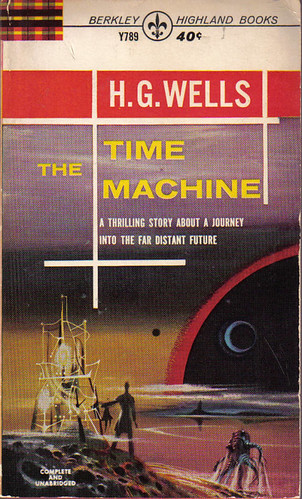 How does an author in 1895 who wants to write a book where a man travels into the future escape the eventual datedness of his book when someone reads it in 100 years and man hasn’t invented the jet-packs, Utopian society, or contact with alien life that he predicted? Why he sets the book in the year 802,701. Try to argue with those predictions, because you can’t.
How does an author in 1895 who wants to write a book where a man travels into the future escape the eventual datedness of his book when someone reads it in 100 years and man hasn’t invented the jet-packs, Utopian society, or contact with alien life that he predicted? Why he sets the book in the year 802,701. Try to argue with those predictions, because you can’t.This was just the tactic taken in my most recent sci-fi read: The Time Machine, by H. G. Wells (1895 – although my copy was printed around 1960, check out the back cover complete with movie stills here). I read The Invisible Man last year, and really enjoyed it. The Time Machine is the novel Wells wrote just before The Invisible Man, and it is equally as great.
This is one of the best explorations of the implications of evolution that I have ever read in a science fiction book. Our hero builds his machine and lands in the aforementioned year in the distant future where he comes across a race of rather small and androgynous humans who do nothing but eat fruit, grow beautiful flowers, and have sex all day long. Nice. He notes:
“Seeing the ease and security in which these people were living, I felt that this close resemblance of the sexes was after all what one would expect; for the strength of a man and the softness of a woman, the institution of the family, and the differentiation of occupations are mere militant necessities of an age of physical force; where population is balanced and abundant, much childbearing becomes an evil rather than a blessing to the State; where violence comes but rarely and off-spring are secure, there is less necessity—indeed there is no necessity—for an efficient family, and the specialization of the sexes with reference to their children’s needs disappears. We see some beginnings of this even in our own time, and in this future age it was complete. This, I must remind you, was my speculation at the time. Later, I was to appreciate how far it fell short of the reality.”
And why does it deviate from reality? Well, I think you should read it for yourself [and isn't weird that lately everything I've been reading is available in full-text for free on the Internet? I've got to check out some more recent stuff...], but the short version is that these little guys aren’t the only descendants of the human race on the planet, and the other ones aren’t quite so utopic and nice. Wells plays around with the class system, evolution, the environment, and all kinds of other things here. You should really check it out.
And to top it all off, I found this receipt in my book! I love that kind of thing.
2 comments:
weird. i was just thinking about reading this ever since i heard the this american life episode about a guy who was inspired by this book to build a time machine so he could go back in time to visit his dead father. worth checking out:
http://www.thislife.org/pages/descriptions/07/324.html
And in another weird coincidence, I just the other day heard about the book that guy wrote about his time machine and put it on my list of things to check out. I hadn't heard the This American Life episode though -- I'll have to give it a listen.
Post a Comment